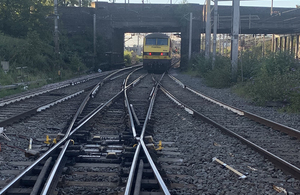Report 05/2024: Signal passed at danger at Stafford Trent Valley Junction No. 1
RAIB has today released its report into a signal passed at danger at Stafford Trent Valley Junction No. 1, 22 August 2023.

The locomotive involved immediately after the incident (courtesy of Network Rail).
Summary
At about 16:41 hrs on 22 August 2023, an electric locomotive operated by Freightliner passed a signal at danger (red) on the approach to Stafford Trent Valley Junction No. 1. The locomotive was on a test run, after repair work, and continued for 740 metres beyond the signal, before running through points as it came to a stand at the junction.
The position where the locomotive stopped conflicted with a route that had been set for a southbound train, although that train was not in the immediate vicinity at the time that the locomotive stopped. A second, northbound, train had passed the junction a few seconds before the locomotive reached the points, but the locomotive did not foul the line that the northbound train had been travelling on.
No one was injured in the incident and the locomotive did not derail, although some damage was sustained to the points which were run through.
The investigation found that the locomotive had been travelling too quickly as it approached the red signal before the junction, meaning it was unable to stop before passing it. This was because the driver’s focus was diverted from the aspects showing at previous signals which warned that a red signal should be expected ahead. This took place while the driver was dealing with a fault that had occurred on the locomotive and which had caused the driver to bring the locomotive to a stand at a previous signal. It is possible that this previous signal was not clearly visible to the driver when they restarted the train after resetting the fault, and that the presence of the fault, and the need to rectify it, distracted the driver, who had not experienced that scenario before.
RAIB found that Freightliner had no formal process for managing the risks associated with the operation of test runs and light locomotives, and that its competence management system had not equipped the driver to deal with an unexpected and potentially distracting situation in an effective and safe manner.
RAIB also found that the consequences of the incident were exacerbated by the high level of acceleration applied after the driver cleared the fault, the configuration of the locomotive and by the locomotive being driven at speeds above those permitted by relevant operating rules. RAIB also found that no engineered safety system intervened to apply the locomotive’s brakes before they were applied by the driver.
Recommendations
RAIB has made two recommendations to Freightliner. The first deals with reviewing risk assessments and processes for the operation of light locomotives and test runs, to better manage the operational risk. The second relates to how train drivers are trained and assessed in the skills required to manage out-of-course, abnormal and potentially stressful events.
Three learning points have also been identified. These relate to the need to comply with rules relating to locomotive speeds, the requirements for the development and maintenance of route knowledge, and settings for train protection systems.
Notes to editors
-
The sole purpose of RAIB investigations is to prevent future accidents and incidents and improve railway safety. RAIB does not establish blame, liability or carry out prosecutions.
-
RAIB operates, as far as possible, in an open and transparent manner. While our investigations are completely independent of the railway industry, we do maintain close liaison with railway companies and if we discover matters that may affect the safety of the railway, we make sure that information about them is circulated to the right people as soon as possible, and certainly long before publication of our final report.
-
For media enquiries, please call 01932 440015.